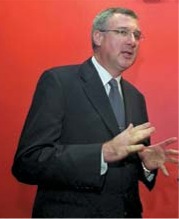|
|
Professor Crown talks
Lisbon, his "penniless" father and his daughters
15.07.08
OUTSPOKEN cancer
specialist Professor John Crown believes Ireland's
health service is "bureacratised to death".
He said it was laughable that the Health Service
Executive (HSE) was now returning to the health
board system it abolished several years ago.
He told the audience at the 'Up Here We're Dying to
Live' conference at the Mount Errigal Hotel on
Saturday:
"Anybody would have laughed if they didn't feel
saddened by the announcement over the last week that
the HSE is going back to a devolved
partly-regionalised model having nine years ago told
us about the wonders of the centralised model and
how it was going to fix all of the adminstrative
problems in the health service."
And he feared that things would only get worse now
that the Irish economy was in the grip of an
economic downturn. But he said the policy makers had
to shed the "erroneous notion" that spending on the
health service was bad for the economy. |
Professor Crown, who is
medical oncologist at St. Vincent's Hospital in
Dublin and a leading cancer researcher, said he
deliberately did not take a public position on
Lisbon.
"I very deliberately did not take a public position
on the Lisbon Treaty because I did not understand it
but I can say now that the vote is over, that I
would have voted 'No'... because of my real worries
about the democratic deficit and the
bureacratisation which we're seeing in Europe and
culturally which we're seeing in politics across |
 |
Europe and in this
country."
He said the people who suggested that the people
should not have had a say on the Lisbon Treaty were
the same people who believe that patients should not
have any right in deciding what healthcare they
should get and that the only people who should
decide are health administrators and civil servants.
"In Ireland, in general, we have a subsistence
health service. In all kinds of indices for every
single speciality you care to mention, we have the
lowest number per head of population.
"In some cases we have one-tenth or one-twentieth
the European average. There are more oncologists in
Latvia - a poor country like Latvia - than there are
in Ireland.
He said the core of the problem was that Ireland had
a very unfair, inequitable and inefficient health
system.
"Unfairness, inefficiency and poor quality are the
big three and I believe that the reforms that are
currently being propagated will address none of
those."
He showed pictures of his late father Jack Crown who
left Manorhamilton in north County Leitrim in his
late 20s and went as a "poor penniless emigrant" to
New York where worked a number of jobs including
taxi driver, bread truck driver, green keeper on a
golf course etc.
He said his father "prospered modestly" and came
back to Ireland and "thankfully lived long enough to
see his son go to medical school".
Prof Crown recounted the story about his father
coming back from the US. He had private health
insurance and when he went to a heart specialist in
Dublin, the specialist advised him to have surgery.
By chance, he was admitted shortly afterwards with
another complaint to the same hospital. The same
surgeon saw him this time as a public patient and
advised him to keep taking the pills, for his heart.
"I remember thinking there is something very odd
about the system we have here. It is hugely odd,
because it is unbelievably unfair. The treatment
that public and private patients get is vastly
different," he said. He urged the HSE to take
bureacracy out of the health service and urged it to
do away with its plan to send around 200 health
service inspectors around the country to judge the
nation's hospitals.
He said he could save the HSE the money it would
spend on the inspectorate by telling them the
services are "all poor quality".
Rather than spending tens of thousands of euro in
sending a team out to inspect what is known to be
poor quality, he said the HSE should be
concentrating its efforts on fixing the problems and
improving the quality. Meanwhile, during a questions
and answers session with the audience at the DACC
conference, Prof Crown was asked about the cervical
cancer vaccine. He revealed that his daughters "the
Crown girls" had all received the vaccine privately
and he urged people to go private and get the
vaccine. However, he believed the vaccine would
eventually become available on the medical card. |
|

